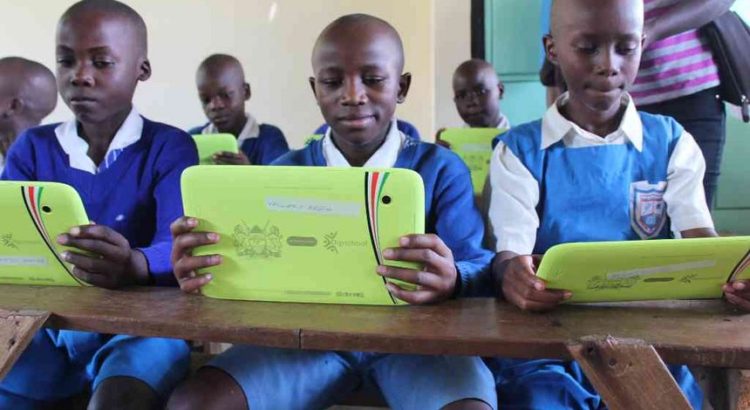África/Kenia/01 Octubre 2016/Fuente:the-star.co.ke /Autor: JOE MUCHERU
Resumen: La próxima década, 2016-2025, promete ser la década del desarrollo de África a través de una transformación propulsadas por las TIC . El lanzamiento de la Iniciativa de África inteligente durante la Cumbre de África en Kigali, Ruanda, en octubre de 2013 marcó un ritmo renovado para la realización de las aspiraciones de desarrollo de África.En Kenia, el Programa de Alfabetización Digital es una de las medidas adoptadas por el gobierno en línea con los objetivos de África inteligente y, de hecho, las aspiraciones del continente.
The next decade, 2016-2025, promises to be the decade of Africa’s development through an ICT-propelled transformation. The launch of the Smart Africa Initiative during the Transform Africa Summit in Kigali, Rwanda, in October 2013 set a renewed pace for the realisation of Africa’s development aspirations.
It is envisaged that through Smart Africa, a single digital and knowledge-driven economy will emerge and push the continent’s global competitiveness to higher levels. However, for this to happen, African countries must take deliberate measures to create enabling platforms for large scale implementation of ICT in all areas of the society and economy.
In Kenya, the Digital Literacy Programme is one of the steps taken by the government in line with the Smart Africa objectives and, indeed, the continent’s aspirations. The government is fulfilling the promise of developing innovative skills for a globally competitive knowledge economy, promoting research and development, promoting locally assembled/manufactured goods and services and enhancing job creation.
Its immediate aim is to integrate ICT into teaching and learning for standard one pupils in public primary schools in order to create a critical mass of future ICT-grounded citizens capable of turning around Kenya’s development fortunes. To date, hundreds of schools have received tablets and, beginning October 30, CSs and their PSs will be out in the field overseeing and inspecting the distribution of digital tablets, laptops, projectors and communications hubs to public primary schools countrywide.
Some 3,000 schools will be installed by the end of October, and by December, the entire country will have been covered, setting Kenya on course towards tech-savvy future generations.
Although the programme was initiated with the main purpose of enhancing learning in public primary schools through the use of digital technologies, it has transferred secondary benefits ranging from lighting up far-flung areas that had no electricity to triggering subsidiary economies that complement the project.
Indeed, DLP manifests how a multi-sectoral approach to project implementation can help confer spin-off benefits on the country and spur economic growth. What started off as a project to provide laptops to standard one pupils, and was heavily criticised in some quarters, has spiralled to become a landmark project that has created opportunities for thousands of Kenyans, way beyond the target population of pupils.
Citizens in remote areas can now get electricity by virtue of their proximity to the targeted schools. There is increased internet access to citizens, increased access to online government services, increased global awareness and collaboration, and greater community participation in education matters through school websites, emails and blogs, among others.
Employment opportunities have been created in development of software, hardware and content. The plans being put in place to ensure the maintenance and sustainability of the programme will result in the development of local assembly and manufacturing capabilities. In the next few years, Kenyans will be able to use digital products designed and made by Kenyans for Kenyans.
Through this collaborative approach, several government agencies under the coordination of the ICT Authority in the Ministry of Information, Communication and Technology have worked together, demonstrating the power of synergy and collaboration among public entities to deliver a shared goal.
For example, the Education ministry has provided leadership in the development of curriculum content for use on the digital platform, capacity building and training for teachers and other relevant education stakeholders. Some 66,000 primary school teachers have been trained on digital literacy to manage the programme.
Eventually, all schools will be provided with internet connectivity so the devices are updated with the latest software, curriculum materials and other approved content. To protect the children from inappropriate content or harmful software, various levels of security will be applied as well as having an approved list of sites they can access.
Isn’t it amazing how what started out as a simple idea has now grown into a truly transformative programme, not just in the education sector, but for the entire country. This will cement Kenya’s position as a regional ICT hub and set our country on the journey to a globally competitive knowledge-based economy.
Fuente de la noticia: http://www.the-star.co.ke/news/2016/09/29/laptops-project-right-on-course_c1428056
Fuente de la imagen: http://www.the-star.co.ke/sites/default/files/styles/new_full_content/public/articles/2016/09/29/1345405.jpg?itok=Oy5IPm6m








 Users Today : 76
Users Today : 76 Total Users : 35460207
Total Users : 35460207 Views Today : 108
Views Today : 108 Total views : 3418891
Total views : 3418891